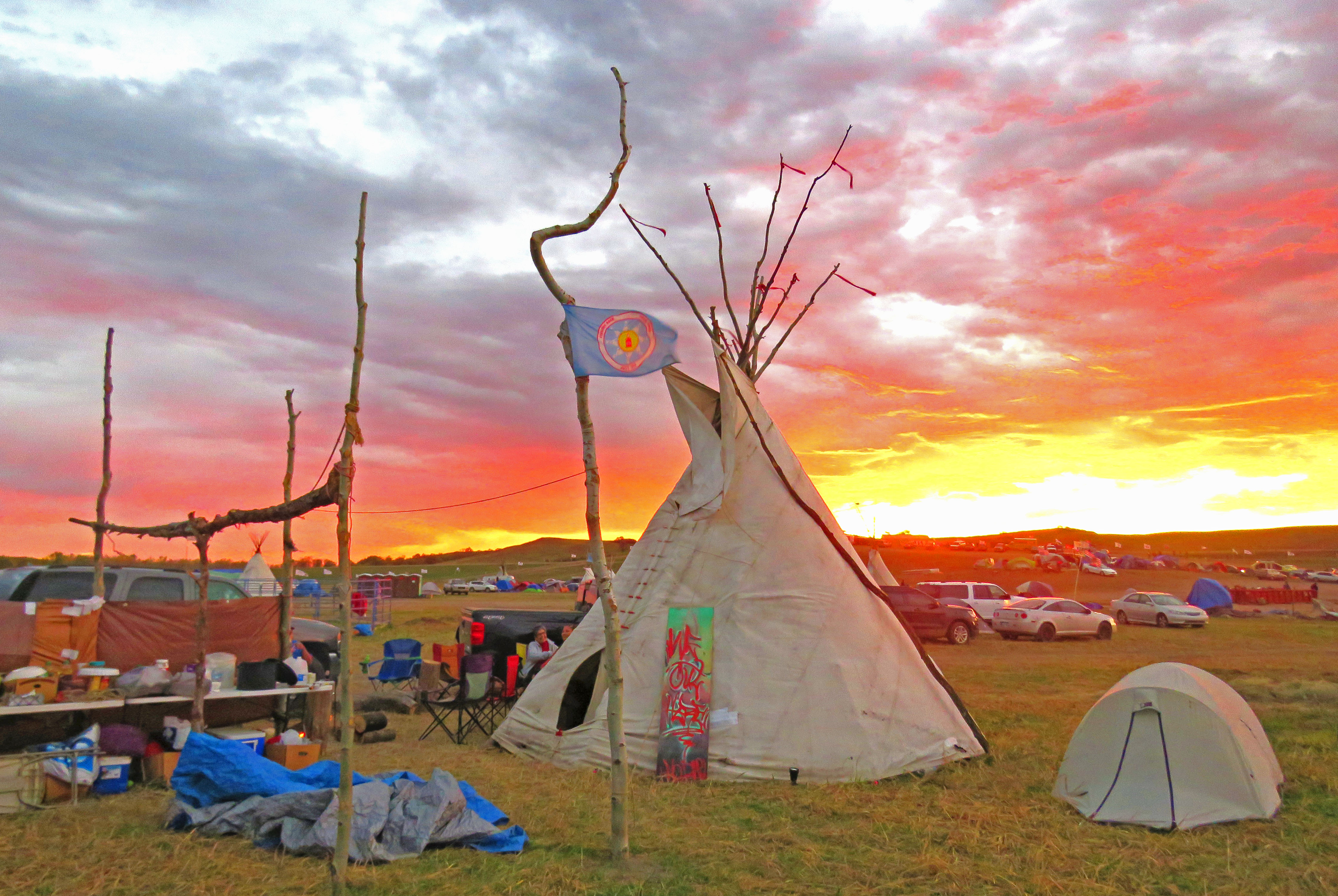
A traditional Sioux teepee at sunrise in the overflow Sacred Stone Camp at Cannon Ball, North Dakota: Walter Simon
VIDEO: A day in the life of the Standing Rock Sioux Dakota Access Pipeline protest camp.
By Glynn Wilson –
CANNON BALL, N.D. – The protest over the Dakota Access Pipeline won another construction delay this week when the Obama administration announced Monday it would put off granting an easement for the pipeline to traverse the Missouri River until the U.S. Army Corps of Engineers conducts a further environmental review with the Standing Rock Sioux Tribe.
In the statement announcing the completion of the review that it launched on Sept. 9, the Army said it “determined that additional discussion and analysis are warranted in light of the history of the Great Sioux Nation’s dispossessions of lands, the importance of Lake Oahe to the Tribe, our government-to-government relationship, and the statute governing easements through government property.”
The Army invited tribal leaders to continue engaging in discussions about potential conditions on an easement for the pipeline crossing that would reduce the risk of a spill or rupture, hasten detection and response to any possible spill, or otherwise enhance the protection of Lake Oahe and the tribe’s water supplies.
“The Army continues to welcome any input that the Tribe believes is relevant to the proposed pipeline crossing or the granting of an easement,” the statement read, hinting that there might still be a chance to change the location of the river crossing by moving the pipeline further away. “We fully support the rights of all Americans to assemble and speak freely, and urge everyone involved in protest or pipeline activities to adhere to the principles of nonviolence.”
While the discussions are ongoing, the Army says, “construction on or under Corps land bordering Lake Oahe cannot occur because the Army has not made a final decision on whether to grant an easement. The Army will work with the Tribe on a timeline that allows for robust discussion and analysis to be completed expeditiously.”
Standing Rock Sioux Tribal Chair Dave Archambault II said while the decision was not 100 percent what the Tribe had hoped for, it is clear President Obama is listening.
“We are encouraged and know that the peaceful prayer and demonstration at Standing Rock have powerfully brought to light the unjust narrative suffered by tribal nations and Native Americans across the country,” Archambault said.
“Together we can inspire people across America and the globe to honor each other and the Earth we hold sacred,” Archambault said. “Millions of people have literally and spiritually stood with us at Standing Rock. And for this, you have our deepest thanks and gratitude. The harmful and dehumanizing tactics by the state of North Dakota and corporate bullies did not go unnoticed because of you. Not all of our prayers were answered, but this time, they were heard.”
The 1,100-mile pipeline was rerouted towards tribal nations after citizens of North Dakota rejected it to protect their communities and water. While the pipeline is nearly complete, it required the final easement to drill under the Missouri River at Lake Oahe just a half a mile upstream of the tribe’s reservation boundary.
The water supply of the tribe and 17 million Americans downstream are at risk for contamination by crude oil leaks and spills, according to the tribe. A single spill would be “culturally and economically catastrophic.”
The Missouri River is the longest river in North America and crosses several states south of the project.
“We call on all water protectors, as we have from the beginning, to join our voices in prayer and to share our opposition to this pipeline peacefully. The whole world is watching and where they see prayerful, peaceful resistance, they join us,” Archambault said.
While the tribe considers the construction delay “a step in the right direction,” its position is that “this ignores the demands made by the tribes, the grassroots encampment, countless allied environmental organizations, and millions of people standing in solidarity across the globe.”
The tribe’s pending lawsuit against the Army Corps for its violation of federal law during the permitting process articulates the tribe’s case, which asks for the Corps to permanently vacate the permits and initiate a full Environmental Impact Statement and a survey of cultural resources in formal nation-to-nation consultation.
The Army Corps has not only refused to perform this review as required by federal law, according to the tribe, but has also allowed the destruction of countless sacred and cultural sites and authorized Morton County to arrest and forcibly remove people trying to access identified sacred sites. The tribe’s position is that demolition of sacred sites on Sept. 3 in order to avoid their protection triggers a clause in Section 110 of the National Historic Preservation Act that prohibits the Army Corps from issuing any more permits for this project.
The coalition on the ground reiterated its demand for a full Environmental Impact Statement and vowed to continue to resist this pipeline “as long as it lacks the free, prior and informed consent of the people of this land.”
Kandi Mosset, Indigenous Environmental Network, Extreme Energy Organizer called the temporary delay a disappointing decision.
“We’re all sitting on pins and needles waiting for an Obama administration to help us and yet they remain silent,” Mosset said. “President-elect Trump has no regard for the environment and cares even less about those of us trying to protect it. The Obama administration, now more than ever, has to step up and either rescind the permits given under Nationwide Permit 12; call for a full Environmental Impact Statement or flat out reject the Dakota Access Pipeline project from moving forward.”
Tara Houska, Honor the Earth, National Campaigns Director, said there are communities going underwater from rising seas and people dying in cancer clusters while indigenous people are being attacked by dogs, maced and shot with rubber bullets.
“Climate change is happening now,” Houska said. “Dakota Access is bulldozing burial grounds and hurting water protectors now. The delays and noncommittal statements from the Obama administration are disappointing to say the least. We want answers. Conduct an Environmental Impact Statement. Halt the construction of this destructive project.”
“We do not negotiate. We cannot negotiate the safety of the water, and we will not negotiate,” said LaDonna Bravebull Allard, Sacred Stone Camp spokeswoman. “We will stand, and continue to stand until every pipe is out of the ground. As our leaders come together, they need to understand that the people’s voice comes first.”
Eryn Wise, International Indigenous Youth Council Spokeswoman, said the youth will not be deterred from the ultimate goal: “killing the black snake and protecting the water.”
“Our ancestors prophesied that we would come together to ensure a future for the next seven generations and that is what we intend to do,” Wise said. “Our very existence is an act of resistance and we will resist the Dakota Access Pipeline every single day until justice is restored to our Mother.”
The “Water Protectors” at Standing Rock have called for a national day of support on Tuesday, Nov. 15, by reminding the Army Corps of Engineers that they can stop this pipeline by refusing a permit for crossing the Missouri river.
LOCAL NOTE
Some people in Mobile, Alabama, will be participating in this on Tuesday with a rally beginning at 6 p.m. and a march from Cathedral Square to the Corps of Engineers headquarters on Saint Joseph Street.
It is designed to “unite our efforts with others near and far to protect the waters and the climate by turning away from a fossil fuelish way of life,” according to local actist and writer David Underhill, “because we too had a crude oil pipeline forced through our water supply a few years ago despite intense local objections and because the Corps has a district headquarters here.”













